英语句子成分及其基本句型(含练习)
英语句子的基本句型和成分(含例题及答案解析)

句子基本结构和成分1句子基本句型英语基本句型分为五种:主谓SV、主谓宾SVO、主系表SLP、主谓双宾SVOO、主谓宾宾补SVOC。
五种句型概述:句型主语谓语/系动词宾语/表语备注主谓SV Everybody laughed.主系表SLP She is a teacher.主谓宾SVO I love you.主谓双宾SVOO David asked me a question.其中‘me’和‘a question’两个宾语。
主谓宾宾补SVOC They painted the wall white.其中,white 为宾补修饰宾语the wall。
1.1主谓句型(Subject Predicate Verb-SV)1.1.1解析主谓句型与主谓宾句型最大的区别在于谓语动词的及物与不及物。
英语把及物动词叫做 transitive verb,不及物动词叫做intransitive verb.”transitive”在英语中是传递的意思,所以,如果动词表示的动作可以直接传递到某个事物,则称为及物动词,反之称为不及物动词。
及物动词与不及物动词又可以称为外动作词和内动作词。
外动作词是动作涉及或(达到)别的事物的动词,内动作词是动作凝于或止于主体本身的动词。
1.1.2基本结构:主语+不及物动词1.1.3主语可以作主语的成分有名词(如boy),主格代词(如you),数词,动词不定式,动名词等。
主语一般在句首。
注意名词单数形式常和冠词不分家。
1.1.4谓语谓语由动词构成,是英语时态、语态变化的主角,一般在主语之后,后接宾语。
但谓语可以是不及物动词(vi.),没有宾语,形成主谓结构。
1.1.5例句分析:(1)The sun is rising. 太阳正在升起。
(2)Tim is sleeping. 蒂姆正在睡觉。
(3)The train is arriving.火车要到站了。
(4)We waited and waited. 我们等了又等。
五种基本句型(含练习及答案)
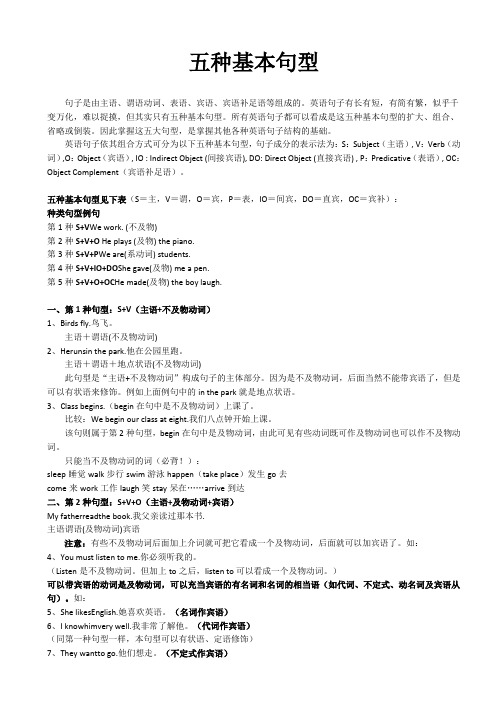
五种基本句型句子是由主语、谓语动词、表语、宾语、宾语补足语等组成的。
英语句子有长有短,有简有繁,似乎千变万化,难以捉摸,但其实只有五种基本句型。
所有英语句子都可以看成是这五种基本句型的扩大、组合、省略或倒装。
因此掌握这五大句型,是掌握其他各种英语句子结构的基础。
英语句子依其组合方式可分为以下五种基本句型,句子成分的表示法为:S:Subject(主语), V:Verb(动词),O:Object(宾语), IO : Indirect Object (间接宾语), DO: Direct Object (直接宾语) , P:Predicative(表语), OC:Object Complement(宾语补足语)。
五种基本句型见下表(S=主,V=谓,O=宾,P=表,IO=间宾,DO=直宾,OC=宾补):种类句型例句第1种S+V We work. (不及物)第2种S+V+O He plays (及物) the piano.第3种S+V+P We are(系动词) students.第4种S+V+IO+DO She gave(及物) me a pen.第5种S+V+O+OC He made(及物) the boy laugh.一、第1种句型:S+V(主语+不及物动词)1、Birds fly.鸟飞。
主语+谓语(不及物动词)2、Herunsin the park.他在公园里跑。
主语+谓语+地点状语(不及物动词)此句型是“主语+不及物动词”构成句子的主体部分。
因为是不及物动词,后面当然不能带宾语了,但是可以有状语来修饰。
例如上面例句中的in the park就是地点状语。
3、Class begins.(begin在句中是不及物动词)上课了。
比较:We begin our class at eight.我们八点钟开始上课。
该句则属于第2种句型,begin在句中是及物动词,由此可见有些动词既可作及物动词也可以作不及物动词。
初中英语句子成分讲解_练习及答案
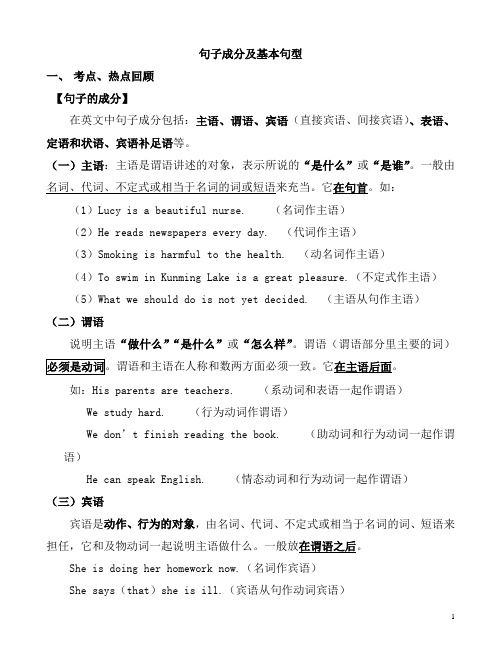
句子成分及基本句型一、考点、热点回顾【句子的成分】在英文中句子成分包括:主语、谓语、宾语(直接宾语、间接宾语)、表语、定语和状语、宾语补足语等。
(一)主语:主语是谓语讲述的对象,表示所说的“是什么”或“是谁”。
一般由名词、代词、不定式或相当于名词的词或短语来充当。
它在句首。
如:(1)Lucy is a beautiful nurse. (名词作主语)(2)He reads newspapers every day. (代词作主语)(3)Smoking is harmful to the health. (动名词作主语)(4)To swim in Kunming Lake is a great pleasure.(不定式作主语)(5)What we should do is not yet decided. (主语从句作主语)(二)谓语说明主语“做什么”“是什么”或“怎么样”。
谓语(谓语部分里主要的词)。
谓语和主语在人称和数两方面必须一致。
它在主语后面。
如:His parents are teachers. (系动词和表语一起作谓语)We study hard. (行为动词作谓语)We don’t finish reading the book. (助动词和行为动词一起作谓语)He can speak English. (情态动词和行为动词一起作谓语)(三)宾语宾语是动作、行为的对象,由名词、代词、不定式或相当于名词的词、短语来担任,它和及物动词一起说明主语做什么。
一般放在谓语之后。
She is doing her homework now.(名词作宾语)She says(that)she is ill.(宾语从句作动词宾语)We often help him.(代词作宾语)He likes to play basketball.(不定式作宾语)We enjoy listening to the music. 我们喜欢听音乐。
有关英语语法中句子成分与五种基本句型问题_附有习题与答案

英语的基本句型主要有五种,它们是:1、主语——动词——表语2、主语——动词3、主语——动词——宾语4、主语——动词——宾语——宾语5、主语——动词——宾语——补语掌握好这些基本句型,就可以为灵活运用语言打下良好的基础。
下面分别讲解这五种句型。
一、主语——动词——表语在这一句型中,动词是系动词,划线部分为表语。
1.Mr.Brown is an engineer.<名词做表语>2.Gradualy he became silent.<形容词做表语>3.She remained standing for a hour.<现在分词做表语>4.The question remained unsolved.<过去分词做表语>5.The machine is out of order.<介词短语做表语>6.The television was on.<副词做表语>7.His plan is to keep the affair secret.<动词不定式做表语>8.My job is repairing cars.<动名词做表语>9.The question is what you want to do.<从句做表语,即:表语从句>注意:在下面的句子中,形容词做表语,在表语的后面常常接不定式结构。
I'm happy to meet you.They are willing to help.We are determined to follow his example.二、主语——动词在这一句型中,动词为不与物动词与不与物的动词词组。
在有的句子中,不与物动词可以有状语修饰。
1.The sun is rising.2.I'll try.3.Did you sleep well?<well做状语,修饰不与物动词sleep>4.The engine broke down.注意:在此句型中,有少数不与物动词表达被动含义,表达主语本身所具有的特性,不用被动语态。
英语句子成分和英语句子结构讲解及练习

英语句子成分和英语句子结构讲解及练习简单句的五个基本句型❖主语+不及物动词She came..❖主语+及物动词+宾语She likes English.❖主语+系动词+主语补语❖She is happy.❖主语+动词+间接宾语+直接宾语❖She gave John a book.❖She bought a book for me.❖主语+动词+宾语+宾语补语❖She makes her mother angry.❖The teacher asked me to read the passage.❖There +be There lies a book on the desk.主谓宾❖名/代--动词--名/代❖we-- saw --you.❖we-- did --the work.❖主系表❖名/代-系动词-形容次/名词/代词❖you are beautiful❖you seems worried.❖you are a stufent.❖相同点都三部分,主语也一样.不同动词和系动词,时态一样,否定式不同.动词加助动词,系动词不用.表语可以是形容词,宾语不行.只有宾语有补足语2、句子成分:英语句子成分分为七种:❖主语、谓语、宾语、定语、状语、表语、宾语补足语;❖1、主语是句子所要说的人或事物,回答是“谁”或者“什么”;通常用名词或代词担任;❖如:I’m Miss Green.我是格林小姐❖2、谓语动词说明主语的动作或状态,回答“做什么”;主要由动词担任;❖如:Jack cleans the room every day. 杰克每天打扫房间❖3、表语在系动词之后,说明主语的身份或特征,回答是“什么”或者“怎么样”;通常由名词、代词或形容词担任;❖如:My name is Ping ping .我的名字叫萍萍4、宾语表示及物动词的对象或结果,回答做的是“什么”;通常由名词或代词担任;❖如:He can spell the word.他能拼这个词❖有些及物动词带有两个宾语,一个指物,一个指人;指物的叫直接宾语,指人的叫间接宾语;间接宾语一般放在直接宾语的前面;❖如:He wrote me a letter . 他给我写了一封信❖有时可把介词to或for加在间接宾语前构成短语,放在直接宾语后面,来强调间接宾语;如:He wrote a letter to me .他给我写了一封信5、定语修饰名词或代词,通常由形容词、代词、数词等担任;如:Shanghai is a big city .上海是个大城市6、状语用来修饰动词、形容词、副词,通常由副词担任;如:He works hard .他工作努力7、宾语补足语用来说明宾语怎么样或干什么,通常由形容词或动词充当;❖如:They usually keep their classroom clean.他们通常让教室保持清洁/❖He often helps me do my lessons.他常常帮我做功课/❖The teacher wanted me to learn French all by myself.老师要我自学法语8☆同位语通常紧跟在名词、代词后面,进一步说明它的情况;❖如:Where is your classmate Tom 你的同学汤姆在哪里1. 主语subject:句子说明的人或事物;The sun rises in the east 名词He likes dancing. 代词Twenty years is a short time in history. 数词Seeing is believing. 动名词To see is to believe.不定式What he needs is a book.主语从句It is very clear that the elephant is round and tall like a tree.It形式主语,主语从句是真正主语一指出下列句中主语的中心词①The teacher with two of his students is walking into the classroom.②There is an old man coming here.③The useful dictionary was given by my mother last year.④To do today's homework without the teacher's help is very difficult.谓语predicate:是对主语加以陈述,表示主语的行为或状态,常用动词或者动词词组担任,放在主语的后面;We study English. He is asleep.二. 选出句中谓语的中心词①I don't like the picture on the wall.A. don'tB. likeC. pictureD. wall②The days get longer and longer when summer comes. A. get B. longer C. days D. summer③Do you usually go to school by busA. DoB. usuallyC. goD. bus④There will be a meeting at the library this afternoon.A. will beB. meetingC. the libraryD. afternoon3. 表语predicative:系动词之后的成分,表示主语的性质、状态和特征;He is a teacher. 名词You don’t look it. 代词Five and five is ten. 数词He is asleep. 形容词His father is in. 副词The picture is on the wall. 介词短语My watch is gone / missing / lost. 形容词化的分词The question is whether they will come. 表语从句常见连系动词❖“存在”类:表示存在或具有某种特征或状态.这类连系动词强调“存在”;常见的有:be 是,look看起来,feel摸上去,seem似乎是,appear似乎、显得,prove证明是,smell闻起来,taste尝起来,sound听起来等;❖例如: The story sounds true.❖Those oranges taste good star.2. “持续”类:表示某种情况或状态的持续;这类连系动词强调“持续”;常见的有:remain依然,keep保持,stay保持,continue继续、仍旧,stand处于某状况或情形等;例如: Why don't you put the meat in the fridgeIt will stay fresh for several days.It's already ten in the morning.The store remains closed.What's the matter3. “变化”类:表示由一种情况或状态变化成另一种情况或状态;这类连系动词强调“变化”后的情况或状态.常见的有:become变成, turn变成, grow变得, get变得等;❖例如: Put the fish in the fridge, or it will go bad in hot weather.三挑出下列句中的表语①The old man was feeling very tired.②Why is he worried about Jim③The leaves have turned yellow.④Soon They all became interested in the subject.⑤She was the first to learn about it.①tired ②worried ③yellow ④interested ⑤first4. 宾语:1动宾表示行为的对象,常由名词或者代词担任;放在及物动词或者介词之后;如:I like China. 名词He hates you. 代词How many do you need We need two. 数词I enjoy working with you. 动名词I hope to see you again. 不定式Did you write down what he said 宾语从句2介词后的名词、代词和动名词-----介宾Are you afraid of the snakeUnder the snow, there are many rocks.3双宾语-----间宾指人和直宾指物He gave me a book yesterday.Give the poor man some money四挑出下列句中的宾语❖①My brother hasn't done his homework.❖②People all over the world speak English.❖③You must pay good attention to your pronunciation.❖④How many new words did you learn last class❖❖⑤Some of the students in the school want to go swimming.❖his homework ②English ③your pronunciation ④new words ⑤to go swimming 5. 宾补:对宾语的补充,全称为宾语补足语;❖We elected him monitor. 名词❖We all think it a pity that she didn’t come here. 名词❖We will make them happy. 形容词❖We found nobody in. 副词❖Please make yourself at home. 介词短语Don’t let him do that. 省to不定式❖His father advised him to teach the lazy boy a lesson. 带to不定式❖Don’t keep the lights burning. 现在分词❖I’ll h ave my bike repaired. 过去分词扩展:❖主补:对主语的补充;❖He was elected monitor.❖She was found singing in the next room.❖He was advised to teach the lazy boy a lesson.五挑出下列句中的宾语补足语❖①She likes the children to read newspapers and books in the reading-room.❖②He asked her to take the boy out of school.❖③She found it difficult to do the work.❖④They call me Lily sometimes.❖⑤I saw Mr. Wang get on the bus.❖⑥Did you see Li Ming playing football on the playground just now❖❖①to read newspapers and books in the reading-room ②to take the boy out of school❖③Lily ④get on the bus ⑤playing football on the playground❖划出句中的直接宾语和间接宾语❖①Please tell us a story.❖②My father bought a new bike for me last week.❖③Mr. Li is going to teach us history next term.❖④Here is a pen. Give it to Tom.❖⑤Did he leave any message for me❖6. 定语:修饰或限制名词或代词的词、词组或句子;❖Yanling is a chemistry teacher.名词❖He is our friend. 代词❖We belong to the third world.数词❖He was advised to teach the lazy boy a lesson.形容词❖The man over there is my old friend.副词❖The woman with a baby in her arms is my sister. 介词The boys playing football are in Class 2. 现在分词The trees planted last year are growing well now. 过去分词I have an idea to do it well.不定式You should do everything that I do. 定语从句六挑出下列句中的定语❖①They use Mr., Mrs. with the family name.❖②What is your given name❖❖③On the third lap are Class 1 and Class 3.❖④I am afraid some people forgot to sweep the floor.❖⑤The man downstairs was trying to sleep.①family ②given ③third ④some ⑤downstairs7. 状语:用来修饰v., adj., adv., or 句子;表示时间、地点、原因、目的、结果、程度、条件、方式和让步;以下例句按上述顺序排列❖I will go there tomorrow.❖The meeting will be held in the meeting room.❖The meat went bad because of the hot weather.❖He studies hard to learn English well.❖He didn’t st udy hard so that he failed in the exam.❖I like some of you very much.❖If you study hard, you will pass the exam.❖He goes to school by bike.❖Though he is young, he can do it well.七挑出下列句中的状语❖①There was a big smile on her face.❖②Every night he heard the noise upstairs.❖③He began to learn English when he was eleven.❖④The man on the motorbike was travelling too fast.❖⑤With the medicine box under her arm, Miss Li hurried off.❖①on the face ②Every night ③when he was eleven ④fast ⑤With the medicinebox under her arm八、同位语❖当一个概念词在前,后面的词、词组或者句子是在解释前者时,而且两者的语法功能相同,后者就是前者的同位语;❖Mr. Black, our English teacher, is a good tennis player.❖我们的英语老师——布莱克先生是个优秀的网球手;❖Football, the only interest in life, has brought him many friends.❖足球----他唯一的爱好,让他结交了许多朋友;Yesterday I met Tom, a friend of my brother's.❖昨天我遇到了我弟弟的朋友汤姆;That’s her habit, reading in bed.❖躺在床上看书是她的习惯;❖Your suggestion, to strike while the iron is hot, seemed a good idea.❖你建议趁热打铁,这个建议很好;He gave orders that the work should be started immediately.❖他发出指示要立即开始工作;You still haven’t answered my question why you didn’t come to school yesterday.❖你还没有回答我昨天为什么没有上学;同位语从句常跟在某些名词后,对其作进一步的解释;这些名词包括:fact, doubt, idea, news,hope, indication, decision, possibility, assumption, suggestion, question.这类从句常常有that 引导,有时也可以用what, why, whether, when 等引导;九插入语❖插入语是说话者对所表达的意思的补充、强调、解释或者说话的态度,其位置灵活常常用逗号或者破折号分开,并且在语法上不影响其他成份;❖1. 插入语常以副词副词短语、形容词形容词短语、介词短语、短语等形式出现;❖ 1 常见的副词及短语:indeed, surely, however, obviously, frankly, naturally, luckily / happily for sb. certainly 等;九■There be 句型拓展:There be +句词词组”中,there为虚词,be后面的名词词组为句子的真正主语;该句式在使用时须注意如下几点:★There be句式表示“有”时,它表示一种存在关系,通常带有一个地点状语,意为“什么地方时候有……”;句式中的主语只能为表泛指的名词词组,此外,其主语还可以带前置或后置定语;例如:1. There is a blackboard in the classroom.2. There are five minutes to go.3. There are two old women waiting for you at the gate.★在正式文体中,该句式中be动词的单复数形式取决于以下两种情况:❖1该句式中只有一个主语,主语为单数时,be动词用单数;主语若为复数,be动词也用复数; ❖2该句式中有几个并列主语,则按就近原则处理,即与靠近be动词的第一个主语保持一致;例如:❖1. There is room for improvement.❖2. There are three apples on the table.❖3. There were only two pens, a dictionary and a textbook on the desk.★“There be +主语+不定式”中,不定式可以有主动和被动两种形式,不过在口语中主动形式更为常见;例如:1. There is a letter to type today.2. There is no time to lose.3. There are many things to be done now.★There be句式中,be动词有各种变化形式;1be动词有时态变化,可以为一般现在时、一般过去时、现在完成时、过去完成时、将来时等;例如:1. There are a lot of people in the meeting-room.2. There was little left.3. There have been many such traffic accidents in the past few years.4. When he got there, he found there had been no one waiting for him in the room.5. Without air, there would be no living things.6. There is going to be a storm tomorrow morning.2There be句式中,be之前可以有情态动词;例如:❖1. There may be some people who don’t like the film.❖2. There used to be a temple in the village.句子种类一按使用目的可分为陈述句、疑问句、祈使句和感叹句;❖1 陈述句Declarative Sentences:说明一个事实或陈述一种看法;❖Light travels faster than sound.光比声速度快;❖The film is rather boring.这部电影很乏味;❖I haven’t got a camera. 我没有相机.❖They have never met before. 他们以前从没见过面.疑问句Interrogative Sentences:提出问题;有以下四种:a.一般疑问句General Questions:❖Can you finish the work in time❖你能按时完成工作吗❖b.特殊疑问句W Questions; H Questions❖Where do you live❖你住那儿❖How do you know that 你怎么知道那件事c.选择疑问句Alternative Questions:❖Do you want tea or coffee❖❖❖你是要茶还是要咖啡❖d.反意疑问句Tag-Questions:❖He knows her, doesn’t he❖❖他不认识她,对不对= Does he know her❖yes, he does.❖No , he doesn’t.3 祈使句Imperative Sentences:提出请求,建议或发出命令,例如:❖Sit down, please.请坐;❖Don't be nervous 别紧张4 感叹句Exclamatory Sentences:表示说话人惊奇、喜悦、愤怒等情绪,例如:❖What good news it is 多好的消息啊❖How good the news is❖What beautiful flowers they are 多美丽的花啊❖How beautiful the flowers are❖How lovely the child is 多可爱的小孩啊❖What a lovely child he is❖what a cute child he is二句子按其结构可以分为以下三类:❖1 简单句Simple Sentences:只包含一个主谓结构句子叫简单句,例如:❖She is fond of collecting stamps.❖她喜欢集邮;❖We all study hard.❖我们都努力学习.I love sports very much.❖我非常喜欢运动.❖Mum made a beautiful skirt for me.❖妈妈为我做了一条漂亮的裙子.❖We elected him our class president.❖我们选了他做班长.❖There are more than 3000 students in our school.❖我们学校的学生超过3000名.2 并列句Compound Sentences:由两个或两个以上的简单句并列连接起来的句子叫并列句. ❖The food was good, but he had little appetite.❖食物很精美,但他却没什么胃口;❖Let’s hurry, or we will be late.❖咱们赶紧点,要不就迟到啦.❖He studied hard , and he passed the exam.❖他努力学习并通过了考试.❖He felt no fear, for he was very brave.❖他很勇敢,毫不畏惧.❖He was sick, so they were quiet.❖他病了,所以他们很安静.3 复合句Complex Sentences:包含一个主句从句和一个或几个从句的句子叫复合句,从句由从属连词引导,例如:❖The film had begun when we got to the cinema.❖我们到达电影院的时候,电影已经开演了;❖Do you know the man who is in the car❖你认识坐在汽车里的人吗❖❖What he said is not true.❖他说的不是实话.I know it’s difficult to master a foreign language.❖我知道学好一门外语不容易.❖The question is whether he will join us next time.❖问题是下次他是否跟我们一起干.❖The idea that Iraq could be taken within a week or two was an underestimation.❖伊拉克可以在一两周内就可以拿下的这一想法是估计不足的想法.❖To get into university = If you want to get into university you have to pass a number of exams.❖进入大学,你必须通过一系列的考试.元音和辅音的定义:发音时声带振动,呼出的气流通过口腔时不受阻碍,这样形成的语音称为元音;不论声带振动与否,发音时呼出的气流通过口腔或鼻腔时受到一定的阻碍,这样形成的语音称为辅音;发音时声带不振动的辅音称为清辅音;发音声带振动的辅音称为浊辅音;巧记48个国际音标单元音共十二,四二六前中后双元音也好背,合口集中八个辅音共计二十八八对一清又七浊,四个连对也包括;有气无声清辅音,有声无气浊辅音,发音特点应掌握1. 音标必须写在括号里,常用的音标括号有斜头和平头两种,其上端不顶第一线,大致与大写字母相齐,下端在第三格的中2. 音标没有书写体,也没有大小写,因此书写时必须和印刷体一样,直上直下,没有斜度,其书写规格如下所列;3. 下面几个音标是最容易写错的,一定要注意:ai和au不要写成Ai和Au,A:不要写成a:;在打字的时候,不要用a来代替A,把A:打成a:,也不要用g来代替G,把GE:l打成gE:l;4. 音标没有书写体,也没有大小写,因此书写时必须和印刷体一样,直上直下,没有斜度,其书写规格如下页所列元音音标学习元音概述:元音是有噪音的语音;形成元音时,声带振动,气流经由咽腔和口腔逸出时,不受到任何阻碍,没有可以听得到的摩擦声;英语里共有20个元音单元音12个,双元音8个;•元音之间的差异,是由发音时各发音器官所采取的不同位置形成的;所谓“不同位置”,指的是舌头的高低与前后,牙床的开合程度,以及唇形的大小和圆扁;但其中决定的因素是舌头的位置:舌头是在口腔的前部、中部或者后部,决定所发的音是前元音、中元音还是后元音;舌身隆起的高度以及舌的哪一部分隆起最高,决定发出的元音是开口元音、半开元音、合口元音、还是半合元音;牙床开合的程度是由舌位的高低所决定的,而双唇的圆扁和大小对形成不同的元音也有相当的影响;因此,描述一个元音的发音部位,主要是描述它的舌位和唇形; Lesson 1元音i: i ә: ә学习i: 发这个音的字母和字母组合e ea eee: me be she he we eveningee:sweet bee sweep sheep see sleep three greenea:meat leaf sea pea teach eat clean根据发音规则,圈出下列单词中元音字母组合发音相同的两个词;rain bean catfeet teacher dstar tree jeepsea fish thei 发这个音的字母和字母组合i e y ey ay•i: pig fish in fifteen six ship thin•e: begin behind jacket basketball•y: happy heavy busy lorry carry sunny•lovely study thirsty twenty thirty windy rainy•ey: monkey money•ay:Sunday Saturday Friday根据发音规则,圈出每组中元音字母发音不相同的单词; •sit kick lip•gift jam ship•picture big sister•lick pig jellyә: 发这个音的字母和字母组合er ir ur ear orer: her serve termir:bird girl skirt first dirty skirt shirtur:nurse Thursday turtle purple curtainear:early learnor: word work world根据发音规则,圈出每组中元音字母组合发音相同的单词;beer thirsty wheat2. bank king her nursebird rabbit kneerun shirt termә发这个音的字母和字母组合ure er ar or a eure: pictureer:teacher brother dinner father sisterar: sugaror:doctora:panda about above camera sofa China根据发音规则,找出发ә的2个单词写在后面的横线上;sofa road smilefather sister food3. hair deer tiger Chinasoon ear leaderLesson 2音标ɔ: ɔu: u学习ɔ发这个音的字母和字母组合o ao: fox coffee dog shop dogdoctor longa: watch根据发音规则,找出发ɔ:的2个单词写在后面的横线上;teacher box clotheszoo clock dogboss lot violinbeach fox girlu: 发这个音的字母和字母组合o oo uio: do who whoseoo: food moon tooui: fruit juiceu: ruler rude根据发音规则,找出不发u:的单词;1. juice moon zoo panda2. tooth broom eye spoon3. head boot noodles pool4. noon cool boot watchu发这个音的字母和字母组合o oo uo:woman wolf•oo:look good book foot woodu:bull bullet•根据发音规则,选出与其它单词元音发音不相同的单词;book look pulltape sugar footkind wolf bullwood cook name四. 写出单词或音标;•bru:m dɔ: sit bә:d•fut wi: dɔg ′sistә•look do water good •too foot clock first •work sister doctor sea •五. 将下列单词与正确的音标用线连起来;•hot blu:•football huk•blue ki:shook futbɔ:lkiss hɔtLesson 3音标a: Λæ e 练习a: 发这个音的字母和字母组合a ar au ear•a: grass glass class plant dance fastfather lastar: car star arm March garden dark scarfau: laugh auntear: heart•根据发音规则,圈出发a:的2个单词;lip doctor card• 2. cloud cart garden gatescarf dark tiger•4. job lorry March parkΛ发这个音的字母和字母组合o u oo ouo: son come colour love moneyu: sun nut jump gum bus brushsupper usou: touch cousin country•根据发音规则,找出每组中发Λ的单词;cup bed air2. voice boy duck antcorn bear gun 4. cute boy money heræ 发这个音的字母和字母组合aa: dad cap cat bad apple bag flaghand rabbit ant black fat hasstand rat map根据发音规则,找出每组中发æ的单词;bed face sportcup fat pearbat finger treeyoung knife applee 发这个音的字母和字母组合e eae: egg bell desk leg pet ten penea: bread head breakfast•根据发音规则,找出每组中不发e的单词;well leg penmap pet elephantten tall deskhead bed toy音标a: Λæ e 练习•一.抄写音标,一个抄写5遍;•a::Λ:æ:e:____ •二.选出下列没有相同发音的词;• 1. car arm food garden• 2. true jump bus cut• 3. bag short map flag• 4. egg pen head small• 5. got clock bell dog• 6. rabbit book wood foot•7. rat bat apple ten•8. gun star duck moneg•三. 写出单词或音标;•pa:st ru:m swet sit•fæt gɔt cΛp shә:t•bag car bus bread star head•四. 选出下列每题中元音有几种读音,有一种读音的在里画☆,有两种读音的画△,有三种的画◇• 1. hat fast cook last• 2. jeep door sun gum• 3. dad cap hand map• 4. star car cut from• 5. skirt sheep bird her•五. 改变下列单词的一个字母,使它变成另一个单词•like_________________交通工具•hat ________________动物•lake ________________食品•nice _______________数字•hot _________________用品•well _______________用品Lesson 4元音音标ei ai ɔi au练习ai 发这个音的字母和字母组合i y ie uy•i: kite bike nice tiger write knife•y: by cry fly my sky try why•ie:tie pie•uy:buy•根据发音规则,找出每组中发ai的2个单词.•good jam right•mine ice-cream mouse•sit tie eye•small tennis kiteɔi 发这个音的字母和字母组合oi oy •oi: oil boil coin•oy: boy toy根据发音规则,找出每组中发ɔi的2个单词. hear soy cold2. rabbit bed boy noisevoise boil word4. tea enjoy toy milkau 发这个音的字母和字母组合ou ow ou: house mouse mouth trousersow: flower cow how now down •根据发音规则,选出不发au的单词; 1.mouse cloud arm clowntrousers cow mouth3. town dance flower houseblouse now baby四. 把下列单词下正确的音标连接起来•bow bau•gate pai•tray geit•pie trei •poison pɔizn五. 看图、填空、标号•h___t→s__n→e__ __s__ r→•r__l__ __→c__k___→m__ __th Lesson 5元音音标әu iәeәuә的练习әu 发这个音的字母和字母组合o oa owo: nose rose poen overoa: boat coat soap goatow:show window snow bowl根据发音规则,圈出每组中发әu的2个单词;1.coat goat tree riverwindow knife road3. your white row coathen nose lampiә发这个音的字母和字母组合ear eer ear: ear hear teareer: deer beer根据发音规则,圈出每组中发iә的1个单词;beer fair tailpair near comenear tower air4. ring king here threeeә发这个音的字母和字母组合air earair: hair chair pairear:pear bear wear根据发音规则,圈出每组中发eә的1个单词;idea pineapple tailpair climb comehouse tower air4. ring king hare threeuә发这个音的字母和字母组合oor our ureoor: poorour: tourure: sure pure根据发音规则,圈出每组中发uә的1个单词;tourist pineapple tailpair climb furycure tower air4. voice king pure engineer辅音爆破音:ptk bdg摩擦音:f v s z θð破擦音:tr dr ts dz t∫t3鼻辅音:m n η舌侧音:1出现在元音之前叫作清晰舌边音2出现在辅音及单词末尾时叫作模糊舌边音半元音:擦音中气流较弱,摩擦较小,介于元音跟辅音之间的音w j •3 ∫•h rLesson 6辅音音标p b t d练习p 发这个音的字母和字母组合p ppp: piano panda parrot pet shipsheep pig stoppp: apple happy根据发音规则,圈出没有发p的单词;phone sleep pearpen big pineappleparrot sheep pigpony pet truckb发这个音的字母和字母组合b bbb: book ball bird big boy bagbananabb:rubber rabbit cabbage根据发音规则,圈出发b的2个单词;gift beach love2. pet god tub bedboy bus makeread dress babyt发这个音的字母和字母组合t ttt: table tea taxi cat rat fat ticketTt: butter matter根据发音规则,圈出没有发t的1个单词;fat bag toyticket tea duckpacket cat raind发这个音的字母和字母组合d edd: duck seed door desk day redhead bed read colded: smiled opened played根据发音规则,圈出没有发d的1个单词;clothes handcold fiveduck grape音标p b t d练习一.抄写音标,一个抄写5遍;•p:b:t:d:_______ 二. 选出下列没有相同发音的词• 1. pear ship coat pig• 2. taxi bean cab cabbage• 3. hat sea ticket wallet• 4. seed dance hand full• 5. pick pen sit pineapple• 6. cold find door chair•7. cloth purple pool push•8. eat fan quiet set三.写出单词或音标;•pændәkΛt di:p klaud •apple pear rabbit read 四. 改变下列单词的一个字母,使它变成另一个单词;•short→_____________衣物sea→_________________感官动词•pet →______________蔬菜ten→___________________ 动物Lesson 7辅音音标k g s z学习g发这个音的字母和字母组合g ggg: glass golf get girl bag goatflaggg: egg根据发音规则,圈出发g的单词;gas drive gum give violin bagjeans orange log bridge guesstank grade long languages发这个音的字母和字母组合s c ss ces: star sun snake sea seec: pencil city cedar ceiling celebratess: grass glass class bossce: face race rice nice根据发音规则,圈出每组中2个发s的单词;1. whose juice lick student2. those case scarf shoes3. space nose science meat4. tears piece bus noseLesson 8辅音音标∫3 t∫d3练习3发这个音的字母和字母组合ss: television, usually, Asiameasure a garage,an unusual collision; a great decision;my pleasure根据发音规则,圈出下列单词中发3的2个单词;1. shell ship garage desk2. truck shirt pleasure ship3. brush casual sheep sleep4. hero shape leisure shelft∫发这个音的字母和字母组合ch tchch: teacher peach cherry chairtch: watch match根据发音规则,找出下列单词中发t∫的单词,并抄下来;chair dumpling beach cheesenight she monkeyChina church these flower eggdream shark chick catchLesson 9音标f v θð的练习v发这个音的字母和字母组合v vev: video vase vestve: five love violin根据发音规则,在不发v的单词上打×violin move vote windowvan volcano white womanvictory wet wave vaseð发这个音的字母和字母组合thth: father mother brother clothesweather根据发音规则,圈出每组中发ð的1个单词;1.than sister brother three2. weather thank night good3. tie look teeth they4. thin father throat watchLesson 10辅音音标tsdz tr dr的练习dz 发这个音的字母和字母组合ds desds: seeds woods friends birds bedsdes: rides根据发音规则,找出发dz的5个单词写在后面的横线上;coats hands cats kitesbeds words pets kidsseats horse sands gatestr 发这个音的字母和字母组合trtr: tree truck trousers strawberry trick根据发音规则,找出没有发tr的3个单词写在后面的横线上; seats truck train trash tractordrink street drug trousersdr 发这个音的字母和字母组合drdr: draw drink driver dragon dry根据发音规则,找出每组中发dr的2个单词写在后面的横线上;1. dream duck dress rain2. rat drain drug door3. tree treasure drawer drink4. truck dragon dish drumLesson 11辅音音标hrlm的练习r 发这个音的字母和字母组合r rr wrr: rice room ride road roserr: mirror carrot parrotwr: write wrong wrap根据发音规则,选出发r的单词,打√;1. bread driver wrong rain worker2. river father robot rope sister3. write fruit rabbit crown druml 发这个音的字母和字母组合l ll•l: look light lock lucky lion tail•ll: ball pull dollar tell根据发音规则,选出每组中不发l的单词;• 1. lamp nail flag woman• 2. yellow fruit lion lychee• 3. grape bull laugh lake• 4. dumpling moon wheel whaleLesson 12音标n ηw j的练习n发这个音的字母和字母组合n kn gnn: nose net nut banana noodles train rain plane down kn: knee knife knockgn: sign根据发音规则,找出发n的单词并抄下来;1. mirror wheel yes knock2. mall hen laugh nut3. earrings plane wing breadη发这个音的字母和字母组合n ngn: ink bank tank fingerng: sing hang song king reading running根据发音规则,从下列每组中找出2个发η的单词;1.net ring finger meat2. tennis mouth song swing3. dumpling wing run nail4. hang swim ink notew发这个音的字母和字母组合w: winter window watch water well wouldwh: white where which when why wheel whale根据发音规则,选出每组中不发w音的1个单词;1. wood write wheel which2. wheat snow wet woman3. white window now why4. whale water watch rowj发这个音的字母和字母组合yy: yo-yo yogurt yard yes you your根据发音规则,找出发j的单词写在下面横线上;cry you your sky yellow lorrymoney jelly toy boy yogurt soy。
学好英语要从学句子成分和基本句型开始,附试题练习

学好英语要从学句子成分和基本句型开始,附试题练习主语(subject)、谓语(predicate)、宾语(object)、表语(predicative)、定语(attribute)、状语(adverbial)、补语(complement)和同位语(appositive)共八种01句子成分和基本句型讲前练指出下列句子中划线部分的句子成分并总结出该句的基本句型结构。
1.They have worked for months and even years.成分:主语谓语时间状语句型结构总结:主语+谓语(不及物动词)2.The film you see on the screen is the product of a huge amount of hard work成分:主语定语谓语表语句型结构总结:主语+系动词+表语3. I didn’t understand all of the traditional customs at first.成分:主语谓语宾语状语句型结构总结:主语+谓语(及物动词)+宾语4.Traditional festivals teach us a lot about our nation’s history成分:主语谓语间接宾语直接宾语句型结构总结:主语+谓语(及物动词)+双宾语(间接宾语+直接宾语)5.Traditional festivals enable usto learn fine Chinese values成分:主语谓语宾语宾语补足语句型结构总结:主语+谓语+复合宾语(宾语+补语)小结:从以上的练习中可知英语中的句子成分包括:主语,谓语,宾语,表语,定语,状语,宾语补语6.He was seen playing basketball on the playgroundyesterday.(现在分词短语作主语补足语)02句子成分和基本句型精讲(一)、句子成分:1、主语: 说明句子所谈的是:“什么人”或“什么物”,主语通常由名词、代词或相当于名词的词或短语充当。
英语句子成分讲解(附练习和答案)

系动词
• • • • be feel, look, sound, taste, smell, seem, appear, become, grow, get, turn, fall, go, come continue, remain, stay, keep
状语 - 状语修饰动词、形容词、副词或全句,说明方式、因果、条件、
5种基本句型
1. 2. 3. 4. 5.
Her love died. She loved me. She gave me a kiss. She made me happy. She is lovable.
动词决定句型,但动词决定不了状语和定语的存在与否,或者说,状语 和定语填补动词的语义空缺。
给下列短文划分句子成分。
宾语 –动作的承受者
• 动宾
– – – – – – – I like China. (名词) He hates you. (代词) How many do you need? We need two. (数词) We should help the old and the poor. I enjoy working with you. (动名词) I hope to see you again. (不定式) Did you write down what he said? (宾语从句)
•
介词后的名词、代词和动名词-----介宾
– Are you afraid of the snake? – Under the snow, there are many rocks.
•
双宾语-----间宾(指人)和直宾(指物)
– He gave me a book yesterday. – Give the poor man some money.
(完整版)初中英语句子成分讲解_练习及答案
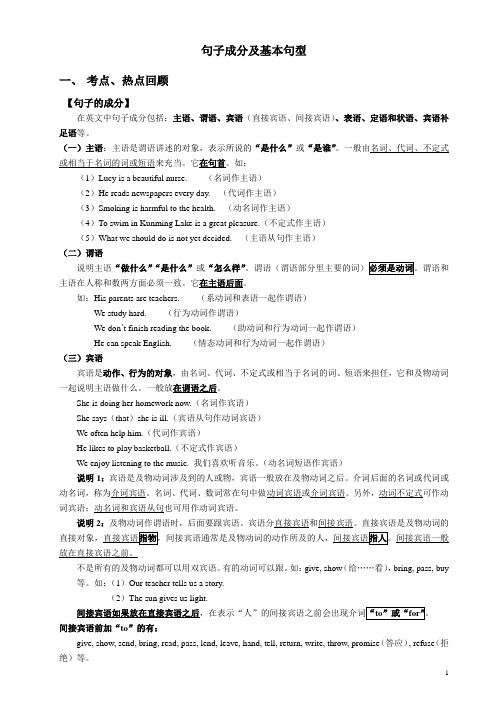
句子成分及基本句型一、考点、热点回顾【句子的成分】在英文中句子成分包括:主语、谓语、宾语(直接宾语、间接宾语)、表语、定语和状语、宾语补足语等。
(一)主语:主语是谓语讲述的对象,表示所说的“是什么”或“是谁”。
一般由名词、代词、不定式或相当于名词的词或短语来充当。
它在句首。
如:(1)Lucy is a beautiful nurse. (名词作主语)(2)He reads newspapers every day. (代词作主语)(3)Smoking is harmful to the health. (动名词作主语)(4)To swim in Kunming Lake is a great pleasure.(不定式作主语)(5)What we should do is not yet decided. (主语从句作主语)(二)谓语说明主语“做什么”“是什么”或“怎么样”主语在人称和数两方面必须一致。
它在主语后面。
如:His parents are teachers. (系动词和表语一起作谓语)We study hard. (行为动词作谓语)We don’t finish reading the book. (助动词和行为动词一起作谓语)He can speak English. (情态动词和行为动词一起作谓语)(三)宾语宾语是动作、行为的对象,由名词、代词、不定式或相当于名词的词、短语来担任,它和及物动词一起说明主语做什么。
一般放在谓语之后。
She is doing her homework now.(名词作宾语)She says(that)she is ill.(宾语从句作动词宾语)We often help him.(代词作宾语)He likes to play basketball.(不定式作宾语)We enjoy listening to the music. 我们喜欢听音乐。
(动名词短语作宾语)说明1:宾语是及物动词涉及到的人或物,宾语一般放在及物动词之后。
五种基本句型(含练习和答案)

. .五种基本句型,似千乎,有简有繁句子是由主语、谓语动词、表语、宾语、宾语补足语等组成的。
英语句子有长有短大、组合、变万化,难以捉摸,但其实只有五种基本句型。
所有英语句子都可以看成是这五种基本句型的扩省略或倒装。
因此掌握这五大句型,是掌握其他各种英语句子结构的基础。
英语句子依其组合方式可分为以下五种基本句型,句子成分的表示法为:S:Subject (主语) , V:Verb(动词),O: Object (宾语), IO : Indirect Object ( 间接宾语), DO: Direct Object ( 直接宾语) , P :Predicative (表语), OC :Object Complement (宾语补足语)。
五种基本句型见下表(S=主,V=谓, O=宾, P=表, IO=间宾,DO=直宾,OC=宾补):种类句型例句第 1 种S+V We work. ( 不及物)第 2 种S+V+O He plays ( 及物 ) the piano.第 3 种S+V+P We are( 系动词 ) students.第 4 种S+V+IO+DO She gave( 及物 ) me a pen.第 5 种S+V+O+OC He made(及物 ) the boy laugh.一、第 1 种句型:S+V(主语 +不及物动词)1、 Birds fly. 鸟飞。
主语+谓语(不及物动词)2、 He runs in the park. 他在公园里跑。
主语+谓语+地点状语( 不及物动词)此句型是“主语+不及物动词”构成句子的主体部分。
因为是不及物动词,后面当然不能带宾语了,但是可以有状语来修饰。
例如上面例句中的in the park 就是地点状语。
了3、Class begins. (begin 在句中是不及物动词)上课比较: We begin our class at eight. 我们八点钟开始上课。
五种基本句型(含练习及答案)

句子是由主语、谓语动词、表语、宾语、宾语补足语等组成的。
英语句子有长有短,有简有繁,似乎千变万化,难以捉摸,但其实只有五种基本句型。
所有英语句子都可以看成是这五种基本句型的扩大、组合、省略或倒装。
因此掌握这五大句型,是掌握其他各种英语句子结构的基础。
英语句子依其组合方式可分为以下五种基本句型,句子成分的表示法为: S:Subject(主语), V:Verb (动词),O:Object(宾语), IO : Indirect Object (间接宾语), DO: Direct Object (直接宾语) , P:Predicative (表语), OC: Object Complement(宾语补足语)。
五种基本句型见下表(S=主,V=谓,O=宾,P=表,IO=间宾,DO=直宾,OC=宾补):种类句型例句第1种S+V We work. (不及物)第2种 S+V+O He plays (及物) the piano.第3种S+V+P We are(系动词) students.第4种 S+V+IO+DO She gave(及物) me a pen.第5种 S+V+O+OC He made(及物) the boy laugh.一、第1种句型:S+V(主语+不及物动词)1、Birds fly. 鸟飞。
主语+谓语 (不及物动词)2、He runs in the park. 他在公园里跑。
主语+谓语+地点状语 (不及物动词)此句型是“主语+不及物动词”构成句子的主体部分。
因为是不及物动词,后面当然不能带宾语了,但是可以有状语来修饰。
例如上面例句中的 in the park就是地点状语。
3、Class begins.(begin在句中是不及物动词)上课了。
比较:We begin our class at eight. 我们八点钟开始上课。
该句则属于第2种句型,begin在句中是及物动词,由此可见有些动词既可作及物动词也可以作不及物动词。
语法系列:句子成分及五大基本句式全解+练习(附答案)
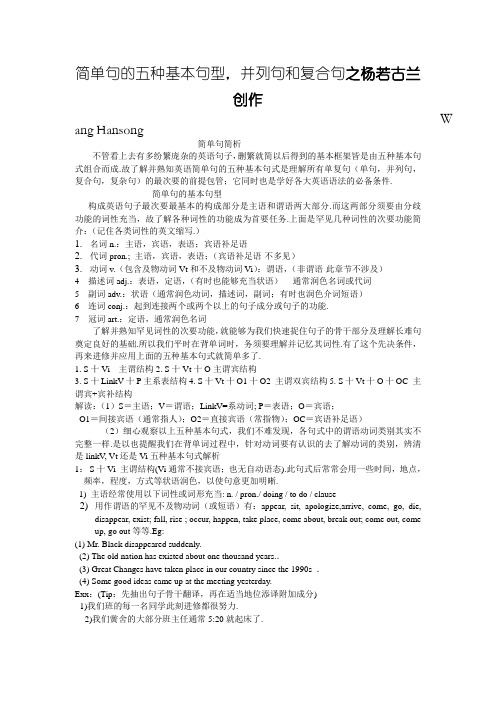
简单句的五种基本句型,并列句和复合句之杨若古兰创作W ang Hansong简单句简析不管看上去有多纷繁庞杂的英语句子,删繁就简以后得到的基本框架皆是由五种基本句式组合而成.故了解并熟知英语简单句的五种基本句式是理解所有单复句(单句,并列句,复合句,复杂句)的最次要的前提包管;它同时也是学好各大英语语法的必备条件.简单句的基本句型构成英语句子最次要最基本的构成部分是主语和谓语两大部分.而这两部分须要由分歧功能的词性充当,故了解各种词性的功能成为首要任务.上面是罕见几种词性的次要功能简介:(记住各类词性的英文缩写.)1.名词n.:主语,宾语,表语;宾语补足语2.代词pron.; 主语,宾语,表语;(宾语补足语-不多见)3.动词v.(包含及物动词Vt和不及物动词Vi):谓语,(非谓语-此章节不涉及)4 描述词adj.:表语,定语,(有时也能够充当状语)-- 通常润色名词或代词5 副词adv.:状语(通常润色动词,描述词,副词;有时也润色介词短语)6 连词conj.:起到连接两个或两个以上的句子成分或句子的功能.7 冠词art.:定语,通常润色名词了解并熟知罕见词性的次要功能,就能够为我们快速捉住句子的骨干部分及理解长难句奠定良好的基础.所以我们平时在背单词时,务须要理解并记忆其词性.有了这个先决条件,再来进修并应用上面的五种基本句式就简单多了.1. S十Vi 主谓结构2. S十Vt十O主谓宾结构3. S十LinkV十P主系表结构4. S十Vt十O1十O2 主谓双宾结构5. S十Vt十O十OC 主谓宾+宾补结构解读:(1)S=主语;V=谓语;LinkV=系动词; P=表语;O=宾语;O1=间接宾语(通常指人);O2=直接宾语(常指物);OC=宾语补足语)(2)细心观察以上五种基本句式,我们不难发现,各句式中的谓语动词类别其实不完整一样.是以也提醒我们在背单词过程中,针对动词要有认识的去了解动词的类别,辨清是linkV, Vt还是Vi五种基本句式解析1: S十Vi 主谓结构(Vi通常不接宾语;也无自动语态).此句式后常常会用一些时间,地点,频率,程度,方式等状语润色,以使句意更加明晰.1) 主语经常使用以下词性或词形充当: n. / pron./ doing / to do / clause2)用作谓语的罕见不及物动词(或短语)有:appear, sit, apologize,arrive, come, go, die,disappear, exist; fall, rise ; occur, happen, take place, come about, break out; come out, comeup, go out等等.Eg:(1) Mr. Black disappeared suddenly.(2) The old nation has existed about one thousand years..(3) Great Changes have taken place in our country since the 1990s .(4) Some good ideas came up at the meeting yesterday.Exx:(Tip:先抽出句子骨干翻译,再在适当地位添译附加成分)1)我们班的每一名同学此刻进修都很努力._____________________________________2)我们黉舍的大部分班主任通常5:20就起床了._______________________________________3) 那场大火大概是前天下战书三点迸发的. _____________________________________ 2. S十Vt (短语)十O主谓宾结构有时句子中含有与宾语有关的状语.作宾语的成分常是:名词、代词、动词不定式、动名词或从句.如:1) We like sports.我们爱好活动.2) He knows what to do next.他晓得下一步做什么.3) He began learning English ten years ago.十年前他开始学英语.4) I have decided to play the flute well.我曾经决定把长笛吹好.5) 我昨天与同班同学一路看了一部电影._______________________________.6) You place me in a difficult situation.___________________________.7) They finally managed to get along with us. ____________________________.8)They have _______ _______ ______ of the children.这些孩子他们照看得很好.17)I don’t like being treated like this.________________________________.(注:少数不及物动词后面可以跟一个不异意义的名词作宾语,如许的宾语就叫做同源宾语.罕见的能带同源宾语的动词有:lead, live, die, sleep, dream, breathe, smile, laugh, fight, run, sing等.例如:1). Under the leadership of the Party, the peasants lead a happy life.2). I dreamed a terrible dream last night.3). Our soldiers fought a wonderful fight against the floods last August.4). He died a glorious death.3: S十linkV十P主系表结构1) He is an IT engineer.他是一名信息工程师.2) The cloth feels smooth.这块布料手感细滑.3) The river near my house looks more beautiful in the early morning. 我家附近的那条河在清晨看上去格外美丽.** 这类句型中的系动词普通可分为以下两类:A. 暗示形态的连系动词.这些词有:be, look, seem, appear, smell, feel, taste,sound,keep, remain, 等等.如:4) We should ________ __________ any time. (坚持谦虚). 5) 这类食物尝起来很蹩脚.___________________________________.B. 暗示改变或结果的系动词.这些词有:become, get, grow, turn, go, come, prove,等等.如:6) Spring comes. It is getting warmer and warmer.7) Don't have the food. _______________________________. (它曾经蜕变了).8) The fact__________ ___________. 这个事实证实是准确的.4. S十V十O1十O2主谓双宾结构,O1=间接宾语;O2=直接宾语1) The old man gave the little boy some coins.老人给了那个小男孩几个硬币.2) Mr. Hardey teaches US European Literature.哈代师长教师教我们欧洲文学.3) His aunt bought him a book and several toys.他婶婶给他买了一本书和几个玩具.4) His praise gave US great encouragement.他的表扬给了我们很大的鼓舞.5) The programmer is showing us how to use the computer.程序员正在教我们如何使用电脑.(这类句型中作间接宾语的经常指“人”,直接宾语经常指“物”.) 如:6)Yesterday her father __________ ______ _____ _______ as a birthday present. 昨天她父亲给她买了一辆自行车作为生日礼物.7) The old man is telling the children stories in the Long March.___________________________________________________.这类句型还可转换为其他两种句型:A.动词+直接宾语+for sb.;B.动词+直接宾语+to sb..8) Pleaseshow me your picture. = Please ______ _____ __________ _________9) I'll offer you a good chance as long as you don t lose heart.= I'll offer ____ ______ ________ ____ _____ as long as you don't lose heart.5: S十V十O十C主谓宾补结构1) We think Creek too difficult.我们认为希腊语太难了.2) Wemade him captain.我们选他作队长.3) They don't want to let us go.他们不想让我们走.4) When the policemen came in,they found the old man dead.警察进来时发现老人死了.5) He 1ikes to watch the boys playing football. 他爱好看那些男孩们踢足球.** 这类句型中的“宾语+补语”可统称为“复合宾语”, 作补语的经常是名词、描述词、副词、介词短语、分词、动词不定式等.如:6)Keep ________________________________, please. 请让孩子们宁静上去. 7)他把墙漆成白色._____________________________________________________.8)我们发现他是一个诚实的人.______________________________________________.留意:动词have, make, let, see, hear, notice, feel, observe, watch等后面所接的动词不定式作宾补时,不带to.但如果变成自动语态,则加上to如:9)The boss made him do the work all day.(变成自动语态)____________________________________________________.Exx:判断上面各句分别属于简单句的哪种基本句型:1. Your sister dances beautifully. ( )2. Doing that would be playing with fire. ( )3. I will tell my friends to protect the environment. ( )4. They kept their marriage a secret. ( )5. She gave me her telephone number. ( )6. Good food keeps you healthy. ( )7. I advise waiting till the right time. ( )8. Did you sleep well? ( )9. Horse-riding and shooting are some of the more unusual events. ( )10. Pop music makes people feel easy and forget about the real world. ( )综合能力练习1. Don't smoke in the meeting-room,_________?A. do youB. will youC. can you D.could you2.Canned food do not go ______ easily.A. sourlyB. sourC. souringD. soured3. I shall make your dream _______.A. coming trueB. come true C.to come true D.comes true4. Even in bed his uneasiness about his riches kept him________.A.wake B.awake C.waken D.to awaken5. I think _______ a good habit to get up early.A.this B.it C.that D.its6. -- Do you know Jim quarreled with his brother?—I don’t know,______.A.nor don’t I care B.nor do I careC.I don’t care neither D.I don’t care also7. The television set will keep us _______of the news of the day.A.informed B.entertained C.educated D.inform8. The speaker found himself _______ all alone.A. leaveB. to leave C.1eaving D.1eft9. The day we were longing for _______ at last.A. coming B.came C.to come D.come10. He did all he could ________the poor people in the mountain area.A.help B.to help C.helping D.helped11. Every minute must be made full use of ________our lessons.A.do B.doing C.done D.to do12. The life he has been used to _________disturbed nowA.being B.be C.to be D.is being13. —Would you like to come to dinner tonight.—I'd like to,__ I'm too busy.A. andB. soC. asD. but14. Mrs. Black doesn't believe her son is able to design a digital camera,________?A. is heB. isn't heC. doesn't sheD. does she15. Brian told you that there wasn't anyone in the room at that time, _______?A. was thereB. wasn’t thereC. didn't heD. did he16. ——How about John?——My aunt ______ a good student.A. believes JohnB. suggests JohnC. considers JohnD. knows John17. I like singing __ she likes dancing.A. asB. whileC. whichD. when18. Yesterday was my birthday. My mother ________.A. made for me a cakeB. made a cake to meC. made me a cakeD. made a cake me19. —I hear you got lost yesterday.—Yes, I went to the zoo and couldn't find ______ the hotel.A. my way back toB. how I should go forC. how to returnD. the way back for20. One more week,____ we will accomplish the taskA. orB. so thatC. andD. if21. ——I had thought I would miss the bus.——_________you wouldn't have arrived on time.A. OtherwiseB. SoC. ButD. That22. —Why didn't you buy it?—_______, nor did the color agree with me.A. Because the price was highB. Not only did it fit meC. For I disliked its materialD. Neither was the quality satisfactory23. —Why didn't you go to the airport to see her off?—Oh,__A. no, I did. But I was lateB. yes, I didn't, I'm sorry for it.C. yes, I did. But I couldn't get there on timeD. no, I'm too busy to spare my time, you know24. —The place isn't too bad, is it?—No,_____ it's a bit too crowded.A. butB. forC. andD. as高考试题精选25. Excuse me for breaking in,_____ I have some for you.A. soB. andC. butD. yet26. The Parkers bought a new house but ______ will need a lot of work before they can move in.A. theyB. itC. oneD. which27. You had one of your teeth pulled out yesterday, _______?A. had youB. hadn't youC. did youD. didn't you28. ______ some of this juice--perhaps you'll like it.A. TryingB. TryC. To tryD. Have tried29. One more week, _________ we will accomplish the task.A. orB. so thatC. andD. if30. —Alice, you feed the bird today, ______?—But I fed it yesterday.A. do youB. will youC. didn't youD. don't you31. Would you like a cup of coffee _____ shall we get down to business right away?A. andB. thenC. orD. otherwise32. She thought I was talking about her daughter, ____, in fact I was talking about my daughter. A. whom B. where C. which D. while33. There is no light in the dormitory. They must have gone to the lecture, _____?A. didn't theyB. don't theyC. mustn't theyD. haven't they34. —I don't like chicken _____ fish.—I don't like chicken,____ I like fishA. and; andB. and; butC. or; andD. or; but35. Be sure to write to us,______?A. will youB. aren't youC. can youD. mustn't you36. ______from Beijing to London!A. How long way it isB. What a long way is itC. How long way is itD. What a long way it is37. Don’t smoke in the meeting-room, ________?A. do youB. will youC. can youD. could you38. Bill’s aim is to inform the viewers that cig arette advertising TV is illegal, ______?A. isn’t itB. is itC. isn’t heD. is he39. There are eight tips in Dr Roger’s lecture on sleep, and one of them is: ______ to bed early unless you think it is necessary.A. doesn’t goB. not to goC. not goingD. don’t go40. ________ straight on and you’ll see a church. You won’t miss it.A. GoB. GoingC. If you goD. When going并列句和复合句句子品种1、按句子的用处可分四种:1)陈述句(肯定、否定):He is six years old. / She didn’t hear of you before.2)疑问句(普通、特殊、选择、反意):-- Do they like skating? / Where did you go yesterday?-- Is he six or seven years old? /Mary can swim, can’t she? / Let’s go, shall we?3)祈使句:Be careful, boys. / Don’t talk in class4)感叹句:What an exciting film it was!/ How clever the boy is!2、按句子的结构可分三种:1)简单句:只要一个主语(或并列主语)和一个谓语(或并列谓语).如:-- He often reads English in the morning.-- Tom and Mike are American boys.-- She likes drawing and often draws pictures for the wall newspapers.2) 并列句:由并列连词(and, but, or等)或分号(;)把两个或两个以上的简单句连在一路构成.如:-- You help him and he helps you.-- The future is bright; the road is tortuous. 前途是光明的,道路是曲折的.3)复合句:含有一个或一个以上从句的句子.复合句包含:名词性从句(主语从句、宾语从句、表语从句和同位语从句)、定语从句和状语从句等.并列句的分类1、暗示连接两个同等概念,经常使用and, not only… but also…, neither…nor…, then等连接.如:The teacher’s name is Smith, and the student’s name is John.2、暗示选择,经常使用的连词有or, either… or…, otherwise等.如:Hurry up, or you’ll miss the train.3、暗示转机,经常使用的连词有but, still, however, yet, while, when等.如:He was a little man with thick glasses, but he had a strange way of making his classes lively and interesting.4、暗示因果关系,经常使用的连词有so, for, therefore等.如:August is the time of the year for rice harvest, so every day I work from dawn until dark.复合句复合句也称主从句,即主句和从句,从句须有引诱词或叫连词引出,否则复合句不成立.因为连词既起连接主句和从句的感化,标明主从句之间的关系,还在从句中充当必定的成分,有必定的意义,故复合句中的连词常成为考查的焦点.从句有三种:1.名词性从句(包含主语从句、宾语从句、表语从句和同位语从句)1)When the train will arrive is unknown.2)Everybody knows that money doesn't grow on trees.3)This is what we should do.4)She told us her hope that she would become a pianist.2.定语从句(描述词性从句)He is the man who I saw in the park yesterday.3.状语从句(副词性从句)He is absent today, because he is ill.Exercise:判断以下句子是简单句、并列句还是复合句:()1. We often study Chinese history on Friday afternoon.()2. The boy who offered me his seat is called Tom.()3. There is a chair in this room, isn’t th ere?()4. My brother and I go to school at half past seven in the morning and come back home at seven in the evening.()5. He is in Class One and I am in Class Two.()6. He was fond of drawing when he was yet a child.()7. Neither has he changed his mind, nor will he do so.()8. What he said at the meeting is very important, isn’t it?()9. The farmer is showing the boy how to plant a tree.()10. Both Tom and Jack enjoy country music.高考考点探讨1、简单句的五大句型是最基本的句型.虽然近几年单纯考查这类基础句型的题不多,但是在浏览中有时需借助于划分句子成分去理解,在书面表达中,没有最基本的遣词造句的能力是不成能用地道的英语句子来表达清楚的.2.祈使句、反意疑问句和感叹句是高考命题的热点之一.有时把祈使句与反意疑问句结合于一体来考查.一个题目,几个考点,是近几年命题的发展趋势.3、高考对简单句、并列句和各种复合句的考查常表示在对连词的选择和使用上.如:and, but, or, while,和其它连接名词性从句、定语从句和状语从句的连接词、关联词.4、各种主从复合句的考查经常与动词的时态联系在一路,以宾语从句与状语从句最为明显,时间, 让步与条件从句中,如果主句是将来时,从句则用普通此刻式表将来,这一点在高考中经常考查.We will go outing if it doesn’t rain tomorrow.巩固练习:一、选择填空:1. Give me one more minute ____ I’ll be able to finish it.A. andB. orC. ifD. so2. It’s the third time that John has been late, __________?A. hasn’t heB. isn’t heC. isn’t itD. hasn’t it3. Let us pass, ___________?A. shan’t weB. shall weC. won’t weD. will you4. I suppose he’s serious, __________?A. do IB. don’t IC. is heD. isn’t he5. I’m sorry to have to say this, ____ you forgot to turn off the li ghts when you left the room last night.A. andB. butC. soD. because6. John has not yet passed the driving test, and ____.A. Henry hasn’t tooB. Henry also has not eitherC. neither Henry hasD. neither has Henry7. There are many sports lovers in his office. Some love climbing, ____ others enjoy swimming.A. orB. forC. whileD. so8. --- Do you feel like going out ____ would you rather have dinner at home?--- I’d like to go out.A. orB. andC. butD. so9. ---- Your uncle isn’t an engineer, is he?---- ____.A. Yes, he isn’tB. No, he isn’tC. No, he isD. He is10. ____ friendly ____ to everyone!A. How, is sheB. What, is sheC. How, she isD. What, she is11. Mary went to bed early, ____ she felt very tired.A. orB. soC. forD. yet12. As he is strong, ____ can lift one hundred poundsA. yet heB. but heC. heD. and13. ____ down the radio ---- the baby’s asleep in the next room.A. TurningB. TurnC. TurnedD. To turn14. ---- I don’t like chicken ____ fish.---- I don’t like chicken ____ I like fish very much.A. or, butB. and, butC. or, andD. and, and15. -- Would you like to come to dinner tonight? -- I’d like to, ____ I’m too busy.A. andB. soC. asD. but二、用适当的连接词填空:1. He closed the window, turned off the light ________ left the room.2. She is American ________ she speaks Chinese very fluently.3. It is foggy today, ________ we can’t see distant hills.4. He likes sports, ________ I’d rather collect stamps.5. ________ he couldn’t understand was ________ fewer and fewer showed their interest in his lesson.6. I wished we could go sightseeing in Hangzhou this summer and ________we could buy somebooks on our way back in Shanghai.7. She expressed the hope ________ she would write a novel someday.8. The girl ________ English is very good won the first place in the 100-metre race, ________made all of us very happy.9. Please tell us the time ________ we shall have the Chinese exam.10. ________ a young man, he was a storekeeper ________ later a postmaster.三、将以下句子译成英语:1. 他下决心不再浪费时间和精力在收集游戏上了.(decided not to do)2. 我们时间很紧,辅佐找辆出租车好吗?(find)3. 有人做演讲时时,我们得坚持宁静,对分歧错误?(反义疑问句)4. 我们把英语看作日常工作中的一种有效的工具.(consider)5. 他们取消了上个礼拜天去扬州的旅游,因为整整下了一天雨.(because)6. 金钱就是一切,这个观点我不爱好.(同位语从句)7. 在黑暗的大街上,没有一个她可以追求帮忙的人.(定语从句)8. 他在这家工厂工作了十年以后就出国了.(after )9. 对于那些热爱户外活动的人来说,加拿大是最适合居住的地方.(定语从句)10. 尽管只要少数人获得成功,很多人还是定居在那.(although/while)简单句参考答案:1. Exx:1. S+ Vi.2. S + linkV + P3. S + Vt. + O4. S + Vt. + O + O.C.5. S + Vt. + I.O + D.O6. S + Vt. + O + O.C.7. S + Vt. + O8. S + Vi. 9. S + linkV + P 10. S + Vt. + O + O.C.2. 综合能力练习1-5 BBBBB6-10 BADBB 11-15 DDDDC16-20 CBCAC21-24 ADCA25-29 CBDBC30-34 BCDDD35-40 ADBADA并列句、复合句参考答案◆Exercise2:1、简单句;2、复合句;3、简单句;4、简单句;5、并列句;6、复合句;7、并列句;8、复合句;9、简单句;10、简单句◆巩固练习:一、1~5 ACDDB 6~10 DCABC 11~15CCBAD二、1. and 2. but 3. so 4. while 5. What; why6. that7. that8. whose, which9. when 10. As, and三、1. He hasdecided not to waste time and energy in computer games.2. We have little time left. Would you please find us a taxi to take.3. we have to keep quietwhen some gives a lecture,, don’t we?4. We consider English (as/to be) a useful tool for everyday work.5. They cancelled their trip to Yangzhou last Sundaybecausse it rained the whole day.6. I don’t like the idea that money is everything.7. In the dark street, there wasn’t a single person to whom she could turn for help.8. After he had worked in the factory for ten years, he went abroad.9. For those who love outdoor activities,Canada is a best country in the world to live in.10. Although only a hand of people were successful, many stayed and established settlement in the area.(While only a few people succeeded, many stayed and settled there.)。
英语句子成分和练习题及答案

句子成分(Members of a Sentence)英语句子的基本结构可以归纳成五种基本句型及其扩大、组合、省略或倒装。
掌握这五种基本句型,是掌握各种英语句子结构的基础。
英语五种基本句型列式如下:一:SV(主+谓)二:SVP(主+系+表)三:SVO(主+谓+宾)四:SVoO(主+谓+间宾+直宾)五:SVOC(主+谓+宾+宾补)基本句型一:SV(主+谓)主语:可以作主语的成分有名词(如boy),主格代词(如you),动词不定式,动名词等。
主语一般在句首。
注意名词单数形式常和冠词不分家!此句型的句子有一个共同特点,即句子的谓语动词都能表达完整的意思。
这类动词叫做不及物动词,后面可以跟副词、介词短语、状语从句等。
S│V(不及物动词)1. The sun │was shining. 太阳在照耀着。
2. The moon │rose.月亮升起了。
3. The universe │remains.宇宙长存。
4. We all │breathe, eat, and drink. 我们大家都呼吸、吃和喝。
5. Who │cares?管它呢?6. What he said │does not matter. 他所讲的没有什么关系。
7. They │talked for half an hour. 他们谈了半个小时。
8. The pen │writes smoothly 这支笔书写流利。
基本句型二:SVP(主+系+表)S│V(是系动词)│P1. This │is│an English-Chinese dictionary. 这是本英汉辞典。
2. The dinner │smells│good.午餐的气味很好。
3. He │fell│in love. 他堕入了情网。
4. Everything │looks│di fferent. 一切看来都不同了。
5. He │is growing │tall and strong. 他长得又高又壮6. The trouble│is│that they are short of money. 麻烦的是他们缺少钱。
英语句子成分和句子结构讲解及练习
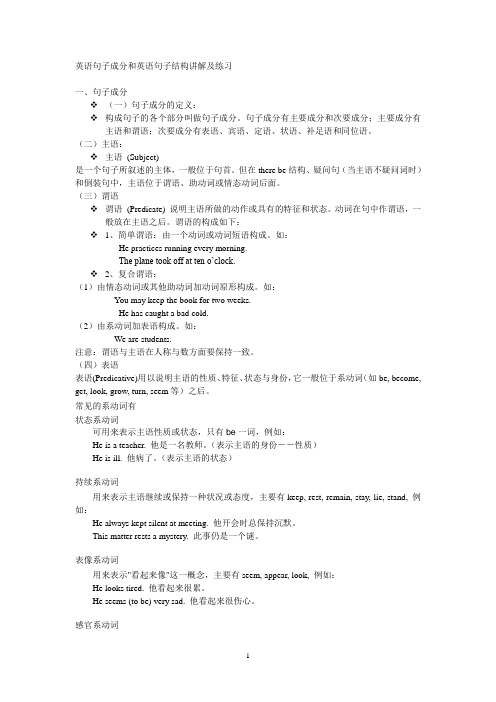
英语句子成分和英语句子结构讲解及练习一、句子成分(一)句子成分的定义:构成句子的各个部分叫做句子成分。
句子成分有主要成分和次要成分;主要成分有主语和谓语;次要成分有表语、宾语、定语、状语、补足语和同位语。
(二)主语:主语(Subject)是一个句子所叙述的主体,一般位于句首。
但在there be结构、疑问句(当主语不疑问词时)和倒装句中,主语位于谓语、助动词或情态动词后面。
(三)谓语谓语(Predicate) 说明主语所做的动作或具有的特征和状态。
动词在句中作谓语,一般放在主语之后。
谓语的构成如下:1、简单谓语:由一个动词或动词短语构成。
如:He practices running every morning.The plane took off at ten o’clock.2、复合谓语:(1)由情态动词或其他助动词加动词原形构成。
如:You may keep the book for two weeks.He has caught a bad cold.(2)由系动词加表语构成。
如:We are students.注意:谓语与主语在人称与数方面要保持一致。
(四)表语表语(Predicative)用以说明主语的性质、特征、状态与身份,它一般位于系动词(如be, become, get, look, grow, turn, seem等)之后。
常见的系动词有状态系动词可用来表示主语性质或状态,只有be一词,例如:He is a teacher. 他是一名教师。
(表示主语的身份--性质)He is ill. 他病了。
(表示主语的状态)持续系动词用来表示主语继续或保持一种状况或态度,主要有keep, rest, remain, stay, lie, stand, 例如:He always kept silent at meeting. 他开会时总保持沉默。
This matter rests a mystery. 此事仍是一个谜。
五种基本句型(含练习和答案)
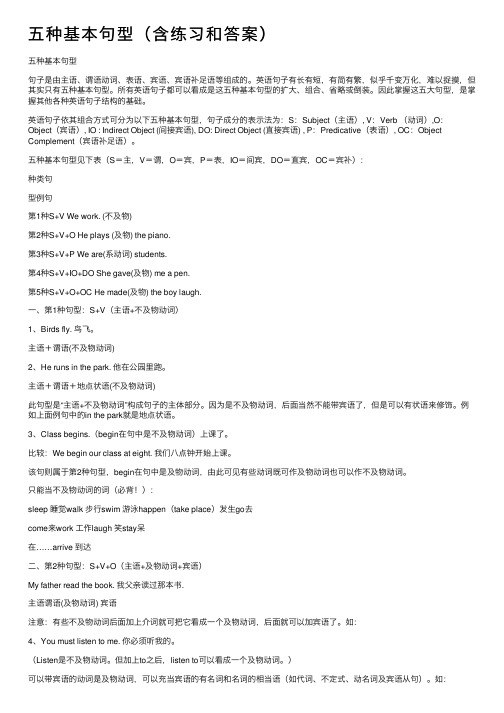
五种基本句型(含练习和答案)五种基本句型句⼦是由主语、谓语动词、表语、宾语、宾语补⾜语等组成的。
英语句⼦有长有短,有简有繁,似乎千变万化,难以捉摸,但其实只有五种基本句型。
所有英语句⼦都可以看成是这五种基本句型的扩⼤、组合、省略或倒装。
因此掌握这五⼤句型,是掌握其他各种英语句⼦结构的基础。
英语句⼦依其组合⽅式可分为以下五种基本句型,句⼦成分的表⽰法为:S:Subject(主语), V:Verb (动词),O:Object(宾语), IO : Indirect Object (间接宾语), DO: Direct Object (直接宾语) , P:Predicative(表语), OC:Object Complement(宾语补⾜语)。
五种基本句型见下表(S=主,V=谓,O=宾,P=表,IO=间宾,DO=直宾,OC=宾补):种类句型例句第1种S+V We work. (不及物)第2种S+V+O He plays (及物) the piano.第3种S+V+P We are(系动词) students.第4种S+V+IO+DO She gave(及物) me a pen.第5种S+V+O+OC He made(及物) the boy laugh.⼀、第1种句型:S+V(主语+不及物动词)1、Birds fly. 鸟飞。
主语+谓语(不及物动词)2、He runs in the park. 他在公园⾥跑。
主语+谓语+地点状语(不及物动词)此句型是“主语+不及物动词”构成句⼦的主体部分。
因为是不及物动词,后⾯当然不能带宾语了,但是可以有状语来修饰。
例如上⾯例句中的in the park就是地点状语。
3、Class begins.(begin在句中是不及物动词)上课了。
⽐较:We begin our class at eight. 我们⼋点钟开始上课。
该句则属于第2种句型,begin在句中是及物动词,由此可见有些动词既可作及物动词也可以作不及物动词。
英语句子成分、种类、练习
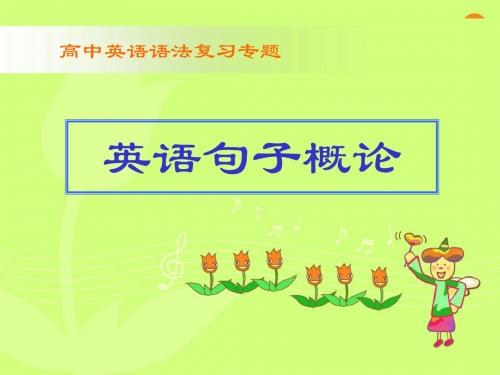
宾语和宾语补足语一起构成宾语的复合结构
八)其他成分 同位语(从句): 对其前面的名词、代词做进一步解释.
That is r. Chen, our English teacher.
China, our motherland, is becoming stronger.
The fact that he told a lie to his mom surprised us.
插入语: 对一句话作一些附加的解释.其作用是句子表意严 密化,补足句意,包括说话者对话语的态度,或引起听话 者的注意。 To be honest, I don’t quite agree with you.
To tell you the truth, I don’t like the film at all.
• 一) 主语:表示句子说的是什么人或什么事, • 由名、代、数、不定式、动名词、短语或句子 来充当。 • 通常位于句首。
Animals also have ears. 名词 He will take you to the hospital. 代词 Three plus four equals seven. 数词 To see is to believe. to do不定式 Smoking is not allowed in public places. 动名词 Whether they will come or not depends on the weather. 句子(主语从句)
• (五) 挑出下列句中的定语
• ① They use Mr./ Mrs. with the family name. • ② What is your given name? • ③ On the third lap are Class 1 and Class 3. • ④ I am afraid some people forgot to sweep the floor. • ⑤ The man downstairs was trying to sleep.
英语句子成分和英语句子结构讲解及练习
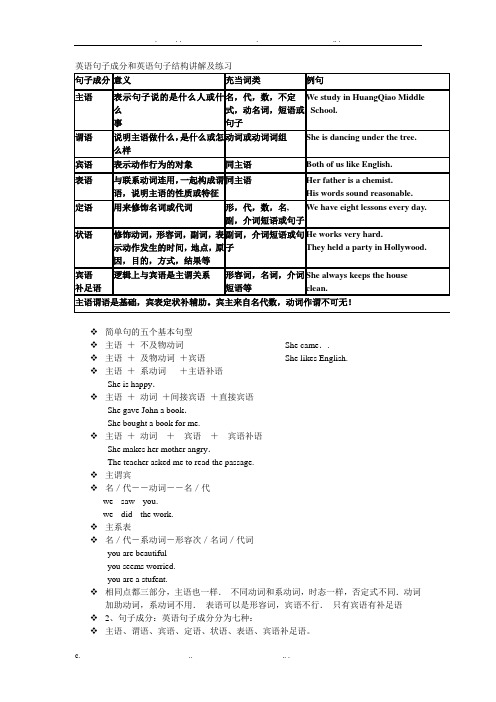
英语句子成分和英语句子结构讲解及练习❖简单句的五个基本句型❖主语+不及物动词She came..❖主语+及物动词+宾语She likes English.❖主语+系动词+主语补语She is happy.❖主语+动词+间接宾语+直接宾语She gave John a book.She bought a book for me.❖主语+动词+宾语+宾语补语She makes her mother angry.The teacher asked me to read the passage.❖主谓宾❖名/代--动词--名/代we-- saw --you.we-- did --the work.❖主系表❖名/代-系动词-形容次/名词/代词you are beautifulyou seems worried.you are a stufent.❖相同点都三部分,主语也一样.不同动词和系动词,时态一样,否定式不同.动词加助动词,系动词不用.表语可以是形容词,宾语不行.只有宾语有补足语❖2、句子成分:英语句子成分分为七种:❖主语、谓语、宾语、定语、状语、表语、宾语补足语。
❖1、主语是句子所要说的人或事物,回答是“谁”或者“什么”。
通常用名词或代词担任。
如:I’m Miss Green.(我是格林小姐)❖2、谓语动词说明主语的动作或状态,回答“做(什么)”。
主要由动词担任。
如:Jack cleans the room every day. (杰克每天打扫房间)❖3、表语在系动词之后,说明主语的身份或特征,回答是“什么”或者“怎么样”。
通常由名词、代词或形容词担任。
如:My name is Ping ping .(我的名字叫萍萍)❖4、宾语表示及物动词的对象或结果,回答做的是“什么”。
通常由名词或代词担任。
如:He can spell the word.(他能拼这个词)❖有些及物动词带有两个宾语,一个指物,一个指人。
英语句子的基本句型和成分(含例题及答案解析)

句子基本结构和成分1句子基本句型英语基本句型分为五种:主谓SV、主谓宾SVO、主系表SLP、主谓双宾SVOO、主谓宾宾补SVOC。
五种句型概述:句型主语谓语/系动词宾语/表语备注主谓SV Everybody laughed.主系表SLP She is a teacher.主谓宾SVO I love you.主谓双宾SVOO David asked me a question. 其中‘me’和‘a question’两个宾语。
主谓宾宾补SVOC They painted the wall white. 其中,white 为宾补修饰宾语the wall。
1.1主谓句型(Subject Predicate Verb-SV)1.1.1解析主谓句型与主谓宾句型最大的区别在于谓语动词的及物与不及物。
英语把及物动词叫做 transitive verb,不及物动词叫做intransitive verb.”transitive”在英语中是传递的意思,所以,如果动词表示的动作可以直接传递到某个事物,则称为及物动词,反之称为不及物动词。
及物动词与不及物动词又可以称为外动作词和内动作词。
外动作词是动作涉及或(达到)别的事物的动词,内动作词是动作凝于或止于主体本身的动词。
1.1.2基本结构:主语+不及物动词1.1.3主语可以作主语的成分有名词(如boy),主格代词(如you),数词,动词不定式,动名词等。
主语一般在句首。
注意名词单数形式常和冠词不分家。
1.1.4谓语谓语由动词构成,是英语时态、语态变化的主角,一般在主语之后,后接宾语。
但谓语可以是不及物动词(vi.),没有宾语,形成主谓结构。
1.1.5例句分析:(1)The sun is rising. 太阳正在升起。
(2)Tim is sleeping. 蒂姆正在睡觉。
(3)The train is arriving.火车要到站了。
(4)We waited and waited. 我们等了又等。
五种基本句型(含练习和答案)

五种基本句型句子是由主语、谓语动词、表语、宾语、宾语补足语等组成的。
英语句子有长有短,有简有繁,似乎千变万化,难以捉摸,但其实只有五种基本句型。
所有英语句子都可以看成是这五种基本句型的扩大、组合、省略或倒装。
因此掌握这五大句型,是掌握其他各种英语句子结构的基础。
英语句子依其组合方式可分为以下五种基本句型,句子成分的表示法为:S:Subject(主语), V:Verb (动词),O:Object(宾语), IO : Indirect Object (间接宾语), DO: Direct Object (直接宾语) , P:Predicative(表语), OC:Object Complement(宾语补足语)。
五种基本句型见下表(S=主,V=谓,O=宾,P=表,IO=间宾,DO=直宾,OC=宾补):种类句型例句第1种S+V We work. (不及物)第2种S+V+O He plays (及物) the piano.第3种S+V+P We are(系动词) students.第4种S+V+IO+DO She gave(及物) me a pen.第5种S+V+O+OC He made(及物) the boy laugh.一、第1种句型:S+V(主语+不及物动词)1、Birds fly. 鸟飞。
主语+谓语(不及物动词)2、He runs in the park. 他在公园里跑。
主语+谓语+地点状语(不及物动词)此句型是“主语+不及物动词”构成句子的主体部分。
因为是不及物动词,后面当然不能带宾语了,但是可以有状语来修饰。
例如上面例句中的in the park就是地点状语。
3、Class begins.(begin在句中是不及物动词)上课了。
比较:We begin our class at eight. 我们八点钟开始上课。
该句则属于第2种句型,begin在句中是及物动词,由此可见有些动词既可作及物动词也可以作不及物动词。
- 1、下载文档前请自行甄别文档内容的完整性,平台不提供额外的编辑、内容补充、找答案等附加服务。
- 2、"仅部分预览"的文档,不可在线预览部分如存在完整性等问题,可反馈申请退款(可完整预览的文档不适用该条件!)。
- 3、如文档侵犯您的权益,请联系客服反馈,我们会尽快为您处理(人工客服工作时间:9:00-18:30)。
We like English very much. 我们非常喜欢英语。
Her uncle lives in Canada. 她叔叔住在加拿大。
She was lying in bed reading. 她躺在床上看书。
United we stand, divided we fall. 团结则存,分裂则亡。(from )
It’s an interesting story. 那是一个有趣的故事。
Do you have time to help us? 你有时间帮助我们吗?
Who is the woman being operated on? 正在动手术的女人是谁?
7. 状语:用于修饰动词、形容词、副词、短语或整个句子等,一般由副词、介词短语、非谓语动词短语或句子充当。用来修饰v., adj., adv., or 句子。 表示时间、地点、原因、目的、结果、程度、条件、方式和让步。
taste(尝、吃起来), remain(保持,仍是), feel(感觉) ….
It sounds a good idea.
The sound sounds strange.
Her voice sounds sweet.
连系动词有意义,不能独立作谓语,
须与表语在一起,常用look,become,be
助动词无意义,不能独立作谓语,
时态、疑问和否定,do,be,will最常用
情态动词must,can,may,表示语气和情态,
人称与数无变化,动词原形跟着它。
感官、使役动词:
一感二听三使四看
一感:feel二听:hear,listen三使:make, let ,have
四看:look at,see,watch,notice
用法口诀
感使动词真奇怪,to在句中像妖怪,
主动句中它走开,被动句中它回来,
动词let要除外,to词可来可不来。
△练习题
一、选择填空:
( )1. ____ will leave for Beijing.
He told us to stay. 他叫我们留下。
I’ve never seen her dancing. 我从未看见过她跳舞。
I found it difficult to refuse him. 我感到很难拒绝他。(from )
6. 定语:对名词或代词进行修饰、限制或说明,一般由形容词、名词、代词、数词、介词短语、非谓语动词及句子等充当,位置可在所修饰的词之前,也可在所修饰的词之后(详见形容词一章)。如:
8. 同位语:若两个语法单位指同一个人或事物,并且,句法功能也一样,那么,后一项称为前一项的同位语。如:
This is my friend Harry. 这是我的朋友哈利。
We students should study hard. 我们学生应该努力学习。
9. 独立成分:与句子其他成分没有通常的语法关系,如插入语、感叹语、呼语等,一般用逗号将它与句子隔开。如:
A. We, us B. Us, we C. We, our D. We, we
( )7. He found the street much ______.
A. crowd B. crowding C. crowded D. crowdedly
Hale Waihona Puke 基本句型一: S V (主+谓)
基本句型二: S V P (主+谓+表)
基本句型三: S V O (主+谓+宾)
基本句型四: S V o O (主+谓+间宾+直宾)
基本句型五: S V O C (主+谓+宾+宾补)
句型1: Subject (主语) + Verb (谓语)
此句型的句子有一个共同特点,即句子的谓语动词都能表达完整的意思,这种句型中的动词大多是不及物动词,动词后不可以直接接宾语,后面可以跟副词、介词短语、状语从句等。常见的动词如:work, sing, swim, fish, jump, arrive, come, die, disappear, cry, happen等。如:
Seventy-four! You don’t look it. (代词)
Five and five is ten. (数词)
He is asleep. (形容词)
Mother bought me a VCR. 妈给我买了一台录像机。
We have finished our work already. 我们已经完成了工作。
3.表语(predicative): 系动词之后的成分,表示主语的性质、状态和特征。
He is a teacher. (名词)
He’s a nice person, to be sure. 肯定他是一个好人。
Strange to say, he did pass his exam after all. 说也奇怪,考试他竟然通过了。
记忆口诀:
动词种类速记:
英语动词分四种,行为连系助动情。
动作状态为行动,充当谓语有作用;
A. Now there the man B. The man here now
C. The man who is here now D. The man is here now
( ) 2. The weather ____.
A. wet and cold B. is wet and cold
It’s getting cold. 天冷起来了。
Now everything is ready. 现在一切都准备好了。
The teacher is very kind to us. 老师对我们很好。
2. 谓语:说明或描述主语的动作、状态或特征,由动词或动词短语充当,位于主语之后。如:
( )10.I will never forget the day ______ I joined the army.
A. that B. when C. in which D. where
-英语五种基本句型
3. The man
4. We all
5. Everybody
6. I
7. They
8. He
9.He
10.They
句型2:Subject (主语) + Link. V(系动词) + Predicate(表语)
此句型的句子有一个共同的特点:句子谓语动词都不能表达一个完整的意思,必须加上一个表明主语身份或状态的表语构成复合谓语,才能表达完整的意思。这类动词叫做连系动词,这种句型主要用来表示主语的特点、身份等。其系动词一般可分为下列两类:
His father is in. (副词)
The picture is on the wall. (介词短语)
My watch is gone / missing / lost. (形容词化的分词)
Tom looks thin.
The food smells delicious.
The food tastes good.
The door remains open.
Now I feel tired.
3)Several players lay flat on the playground.几个队员平躺在操场上。
C. not wet and cold D. were wet and cold
( ) 3. The apple tasted ____.
A. sweets B. sweetly C. nicely D. sweet
( ) 4. He got up ____ yesterday morning.
6. What he said does not matter. 他所讲的没有什么关系。
7. They talked for half an hour. 他们谈了半个小时。
8. The pen writes smoothly. 这支笔书写流利。
S
V (不及物动词)
1. Time
2. The moon
A. lately B. late C. latest D. latter
( )5. The actor ______at the age of 70.
A. dead B. died C. dyed D. deaded
( )6. ____ were all very tired, but none of ____ would stop to take a rest.
(1)表示状态。这样的词有:be, look, seem, smell, taste, sound, keep等。如:
1) This kind of food tastes delicious.这种食物吃起来很可口。
2) He looked worried just now.刚才他看上去有些焦急。
To wear a flower is to say “I’m poor, I can’t buy a ring. ” (不定式)
The question is whether they will come. (表语从句)
常见的系动词有: be, sound(听起来), look(看起来), feel(摸起来),smell(闻起来),
1. The sun was shining. 太阳在照耀着。
2. The moon rose. 月亮升起了。
3. The universe remains. 宇宙长存。
4. We all breathe, eat, and drink. 我们大家都呼吸、吃和喝。
